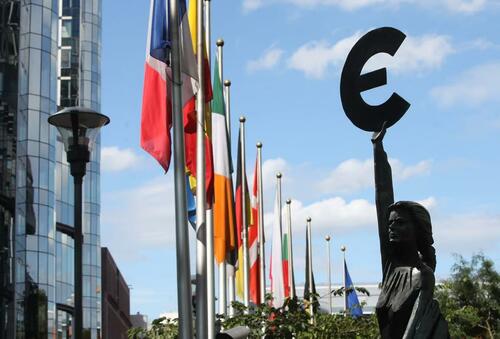
Russia's war in Ukraine, which at the moment is going very badly for the Ukrainians and their NATO backers in what by now can more appropriately be called a proxy war, is causing Europe to shift to a "war economy mode".
Urgent preparation for such a shift is precisely what's being proposed by the European Commission on Tuesday, as several European Union countries are desperately seeking to revive and boost their arms production industry, also at a moment the Zelensky government is begging for more weapons and artillery shells to hold off the steady Russian advance in the east.
"We need to change the paradigm and move into war economy mode. This also means that the European defense industry must take more risks, with our support," said Thierry Breton, the European industry commissioner who is pushing the proposal.

He's laying out a package which promotes expanding arms production capacity and incentivizes countries to purchase more weapons from European companies.
Of course, European countries shouldering more of the defense spending burden for NATO, a role which has long disproportionately fallen on the United States, was long ago loudly called for by then President Trump. He was shunned and mocked at the time by European officials.
But it seems that now Europe is bracing for a possible Trump presidency after the November election. Reuters writes:
Breton, a French former tech company CEO, has also said the possibility of another U.S. presidential term for Donald Trump - who has questioned Washington's commitments to NATO - means Europe has to do more to protect itself.
"In the current geopolitical context, Europe must take greater responsibility for its own security, regardless of the outcome of our allies’ elections every four years,” Breton said.
This is likely also in expectation of a potential Republican administration in the White House which would ensure no more arms funding for Ukraine (or at least not the $60+ billion that Biden is still seeking). Trump on the campaign trail has promised to seek to negotiate a very swift end to the Russia-Ukraine conflict.
Europe is busy trying to "Trump-proof" itself, as officials indicated last month:
“If Trump were re-elected, we would face a situation in Europe that has not occurred since the end of the Second World War,” said Norbert Röttgen, a veteran German lawmaker and ex-chair of the Bundestag’s foreign affairs committee. “Europe would have to stand up for its own security in an unprecedented way.”
Reuters further details of the new "war economy" package, "But officials say the package will create a legal framework that would allow much greater coordinated spending in years to come, if the EU is willing to stump up the cash." Breton wants a special 100 billion euro fund which can be coordinated for defense projects.
Hell of a stat. “Rheinmetall in Germany is producing way more 155 artillery shells than the entire US defense industry combined.” https://t.co/G2IXHJMCXd
— Shashank Joshi (@shashj) February 28, 2024
Alarmingly, one official was cited in the report as saying, "Our mission here is to treat Ukraine as almost equivalent to a member state." Very likely a potential future Trump administration will not see things this way.
Russia’s war in Ukraine, which at the moment is going very badly for the Ukrainians and their NATO backers in what by now can more appropriately be called a proxy war, is causing Europe to shift to a “war economy mode”.
Urgent preparation for such a shift is precisely what’s being proposed by the European Commission on Tuesday, as several European Union countries are desperately seeking to revive and boost their arms production industry, also at a moment the Zelensky government is begging for more weapons and artillery shells to hold off the steady Russian advance in the east.
“We need to change the paradigm and move into war economy mode. This also means that the European defense industry must take more risks, with our support,” said Thierry Breton, the European industry commissioner who is pushing the proposal.

He’s laying out a package which promotes expanding arms production capacity and incentivizes countries to purchase more weapons from European companies.
Of course, European countries shouldering more of the defense spending burden for NATO, a role which has long disproportionately fallen on the United States, was long ago loudly called for by then President Trump. He was shunned and mocked at the time by European officials.
But it seems that now Europe is bracing for a possible Trump presidency after the November election. Reuters writes:
Breton, a French former tech company CEO, has also said the possibility of another U.S. presidential term for Donald Trump – who has questioned Washington’s commitments to NATO – means Europe has to do more to protect itself.
“In the current geopolitical context, Europe must take greater responsibility for its own security, regardless of the outcome of our allies’ elections every four years,” Breton said.
This is likely also in expectation of a potential Republican administration in the White House which would ensure no more arms funding for Ukraine (or at least not the $60+ billion that Biden is still seeking). Trump on the campaign trail has promised to seek to negotiate a very swift end to the Russia-Ukraine conflict.
Europe is busy trying to “Trump-proof” itself, as officials indicated last month:
“If Trump were re-elected, we would face a situation in Europe that has not occurred since the end of the Second World War,” said Norbert Röttgen, a veteran German lawmaker and ex-chair of the Bundestag’s foreign affairs committee. “Europe would have to stand up for its own security in an unprecedented way.”
Reuters further details of the new “war economy” package, “But officials say the package will create a legal framework that would allow much greater coordinated spending in years to come, if the EU is willing to stump up the cash.” Breton wants a special 100 billion euro fund which can be coordinated for defense projects.
Hell of a stat. “Rheinmetall in Germany is producing way more 155 artillery shells than the entire US defense industry combined.” https://t.co/G2IXHJMCXd
— Shashank Joshi (@shashj) February 28, 2024
Alarmingly, one official was cited in the report as saying, “Our mission here is to treat Ukraine as almost equivalent to a member state.” Very likely a potential future Trump administration will not see things this way.
Loading…




